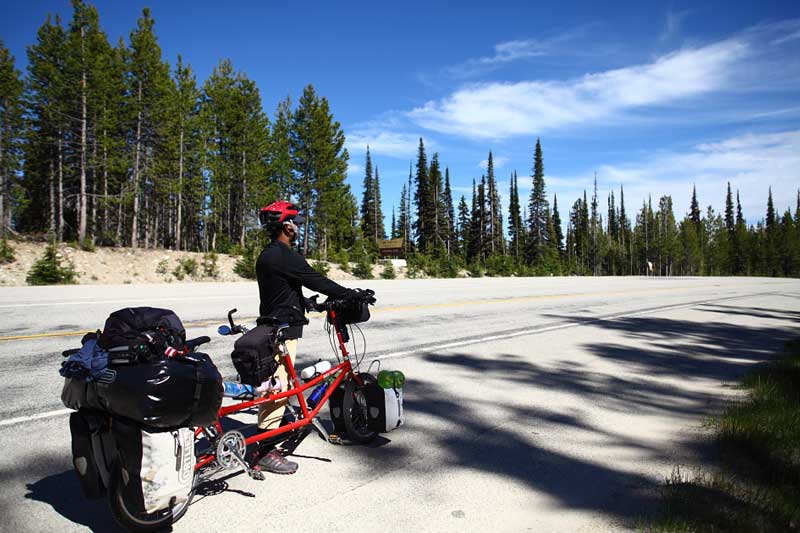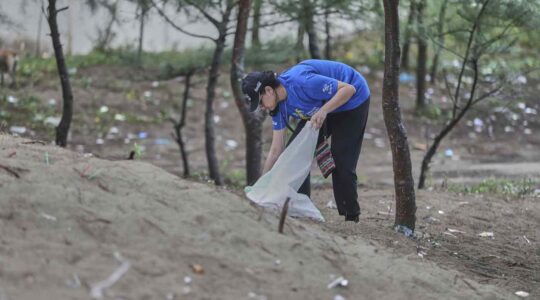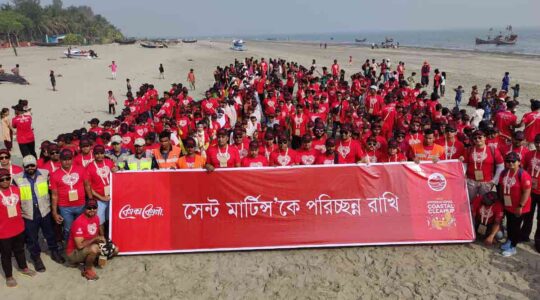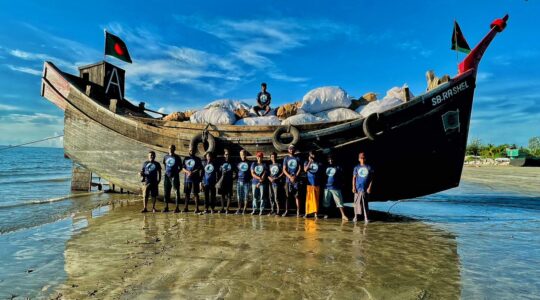
What is Trashmaniac
In Bangladesh, no plastic bag or bottle is ever wasted. But a few wasted plastic bottles in a place thousands of miles away is still bad news to a place that is among the most vulnerable in the world to climate change. That is the cause that two adventure cyclists from Bangladesh are hoping to raise awareness for in their campaign against plastic and other waste in the United States, the highest per capita consumers and trashmakers in the world.
TRASHMANIAC I
 Muntasir Mamun and Mohammad Ujjal will ride this summer to collect and measure the amount of plastic and other waste they come across during their 5000 (The original ACA route is 5000 miles but due to Ragbrai and some other reasons, we are taking shorter route following WA,ID, MO, WY, SD, NS, IO, IN, IL, OH, WV and DC) mile journey from Seattle to Washington DC
Muntasir Mamun and Mohammad Ujjal will ride this summer to collect and measure the amount of plastic and other waste they come across during their 5000 (The original ACA route is 5000 miles but due to Ragbrai and some other reasons, we are taking shorter route following WA,ID, MO, WY, SD, NS, IO, IN, IL, OH, WV and DC) mile journey from Seattle to Washington DC
For many people the idea of climate change is of growing concern, but not necessarily something they feel directly threatened by. The people of Bangladesh however are becoming increasingly alarmed at the potentially devastating consequences that are predicted to occur as sea levels rise in the future as a result if climate change.
By undertaking this journey they hope to raise public awareness as to the impacts of trash not only on the immediate environment where it may be carelessly discarded but also to encourage people to think about the environmental impact chain that reaches right back to it’s production.
Bangladesh is a deltaic plain that lies between the Himalayan Mountains and the Bay of Bengal and is criss-crossed by three major river systems; the Ganges, Brahmaputra and Meghna. It is the combination of these geographical features coupled with its low elevation and dense population that render it highly vulnerable to the impacts of climate change.
MOBILE TECHNOLOGY
A team of MIT students volunteered to develop the mobile app for the project.
WHY FROM BANGLADESH
Bangladesh is living at the Ground Zero for climate change impact. To raise the issue in the international community and also among the general people of the USA. Only reducing consumption of plastic based product will reduce less fuel consumption which is directly regulate carbon emission.
WHY IN THE USA
USA has the highest consumption of plastic/based product. And largest consumer market for bottle water. Visualization of the debris will alert the mass to buy or to use next plastic related product even a bottle of drinking water.
Team:
Muntasir Mamun is a Dhaka-based change-maker, founder of adventure advocacy group Kewkradong Bangladesh and partner of social venture New Market Goods
Ashrafuzzaman Uzzal
TRASHMANIAC II
Adventurers from around the world cycling to raise awareness about trash. Trashmaniac is an ongoing advocacy bike ride crossing countries that contribute the most carbon emissions and consume the most plastic-based products.
We started along the long highways and small towns of the United States and this year we are continuing in the mountains of Alaska and hills of Canada – talking, tracking and recording trash along the way.Trash is one of those things we would prefer not to think about – we all produce it but because it is hidden in recycling and landfill systems, it is easy to forget.Our message is simple: Let’s be more efficient and not waste what we produce.
By reusing materials and consuming more thoughtfully, we can reduce the energy and environmental costs associated with overproducing products that are too quickly discarded as waste.
When : June-July-August 2014
How long: 90 days
Where: From Anchorage, Alaska, USA to Toronto, Canada
CROSS COUNTRY ON BICYCLES TO MEASURE DEBRIS USING SMART PHONES
In Bangladesh, no plastic bag or bottle is ever wasted. If someone leaves it on the ground, someone else will pick it up and reuse it. Plastic waste in a place thousands of miles away is still bad news to a country that is among the most vulnerable in the world to climate change though. Wherever it is produced and consumed, plastic waste contributes huge amounts of carbon to the atmosphere at every stage of its life cycle.
Trash awareness is the cause that four adventure cyclists, united by a love of the environment and of Bangladesh, are passionate about. Trashmaniac started in 2012 on a bicycle built for two, campaigning against plastic and other waste in the United States, the highest per capita consumers and plastic based trashmakers in the world. This year, the team will spend their summer riding across Alaska and Canada to collect 5500 miles of trash data using the Trashmaniac mobile phone application. The trash they find come across will be tracked and spotlighted in real time on their website, www.TrashManiac.com.
The team will be seeing how much plastic and other waste they can collect on their journey and to calculate its impact, not just on the climate but also on energy and the natural environment. The impact of non-recycled plastic or plastic based products is phenomenal– almost every plastic based product is non-bio-degradable and requires significant fossil fuels to produce.
WHY BANGLADESH? THE IDEA FROM GROUND ZERO
The Peoples Republic of Bangladesh is a South Asian country located between Myanmar and India, bordering the Bay of Bengal. This small piece of land is highly vulnerable to climate change because it is low-lying, densely populated and located in the delta of three of the world’s greatest rivers; the Ganges, the Brahmaputra and the Meghna. Trashmaniac aims to make a change for Bangladesh and other low-lying counties by raising the profile of trash and climate change among general people. Only by reducing our consumption of plastic based products will we be able to reduce our fuel consumption and carbon emissions.
Why in THE US and Canada?
The USA consumes the most plastic/based product per capita in the world. It is also the largest consumer market globally for bottle water.
The average Canadian uses about 272 plastic bags a year. If everyone in Canada switched from single‐use plastic shopping bags to reusable ones, we would save the amount of fuel used by 56 753 cars each year.
Visualization of the effects of consuming plastic-based products, and the non-bio-degradable trash they create when they are no longer being used, will give people an idea of just how colossal the problem of global trash is.
Team:
Muntasir Mamun is a Dhaka-based change-maker, founder of adventure advocacy group Kewkradong Bangladesh and partner of social venture New Market Goods
Kanak Aditya is an accomplished singer and visual artist in well-known Bengali band Joler Gaan and managing partner of the popular ethnic Bengali fashion brand Deshal.
Sarah-Jane Saltmarsh is an enthusiastic young adventure chaser with one foot in the United Nations in Asia and the Pacific and the other foot in Australia’s remote Northern Territory.
Christopher York is an avid global traveler from Ontario, Toronto, who has traversed Canada and Alaska many times on motorbike and climbed to Everest Base Camp.










